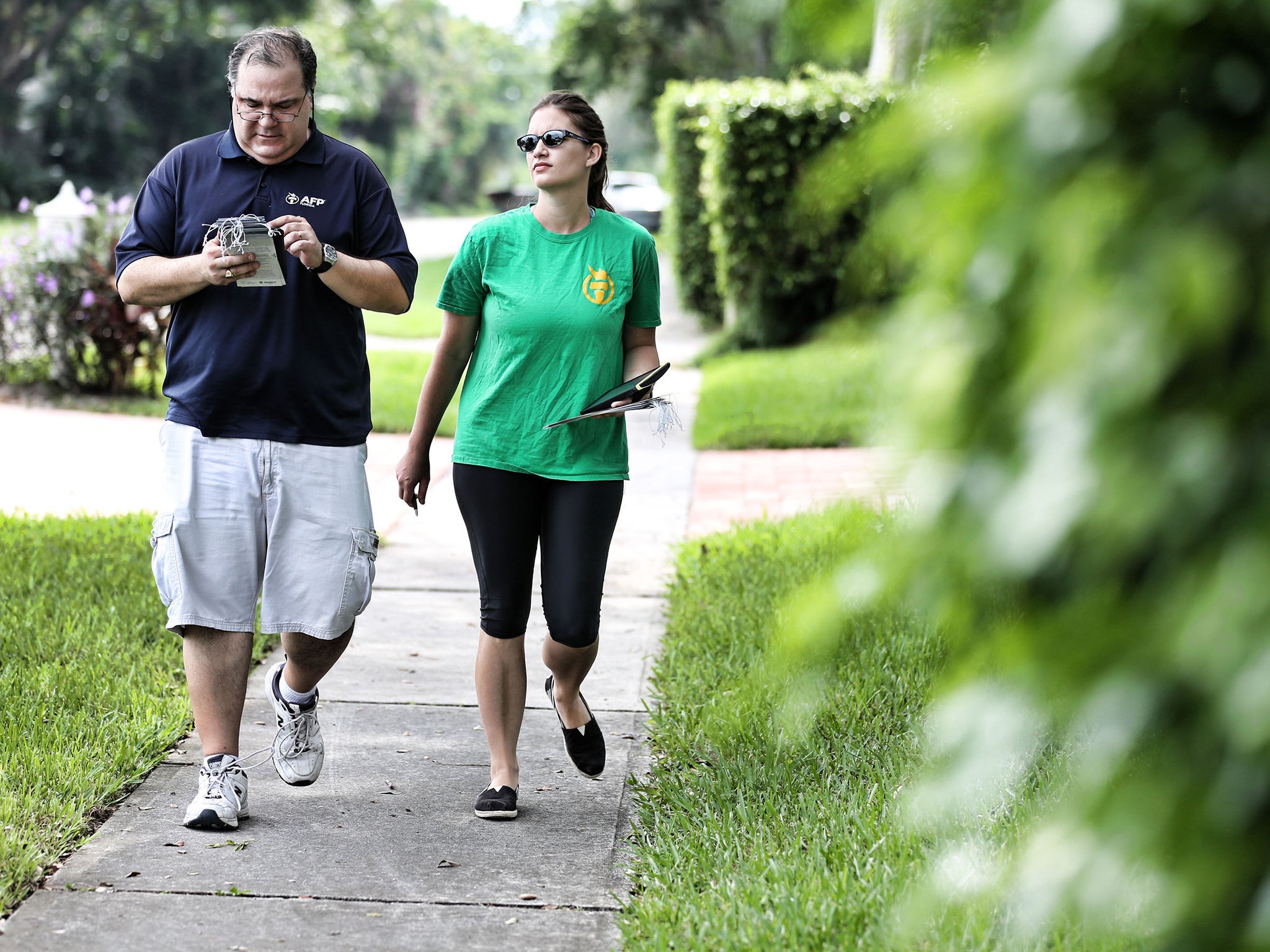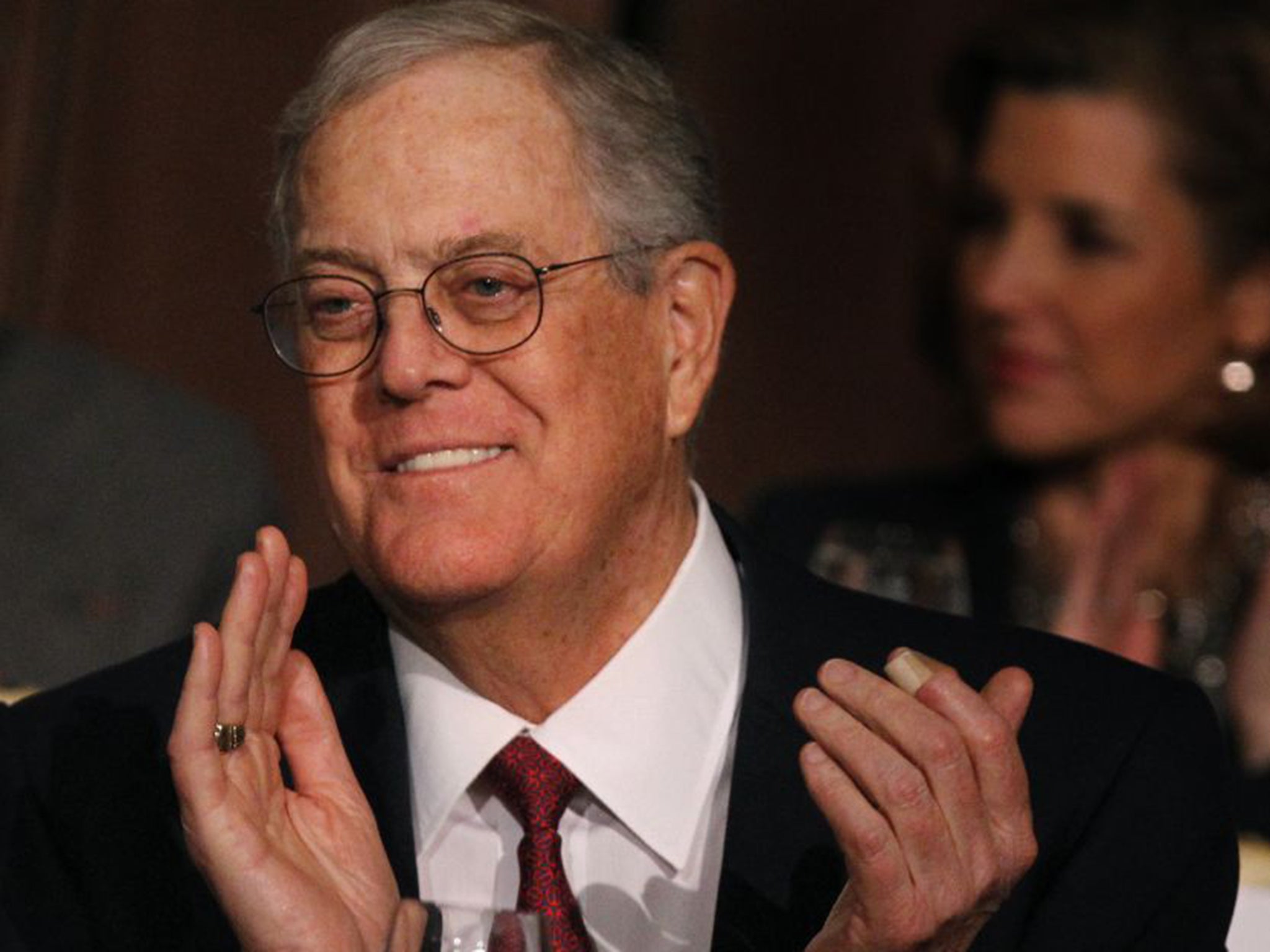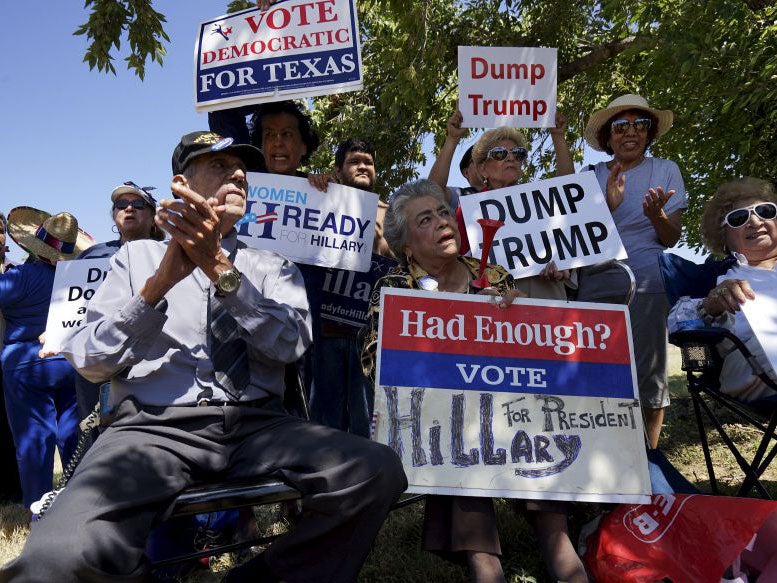US Republican presidential campaign: Koch brothers' army goes door to door in an attempt to swing the US to the right
In another bid to buy the presidency, the ultra-conservative billionaires have enlisted 1,000 full-time staff to collect a vast pool of voter data

Your support helps us to tell the story
From reproductive rights to climate change to Big Tech, The Independent is on the ground when the story is developing. Whether it's investigating the financials of Elon Musk's pro-Trump PAC or producing our latest documentary, 'The A Word', which shines a light on the American women fighting for reproductive rights, we know how important it is to parse out the facts from the messaging.
At such a critical moment in US history, we need reporters on the ground. Your donation allows us to keep sending journalists to speak to both sides of the story.
The Independent is trusted by Americans across the entire political spectrum. And unlike many other quality news outlets, we choose not to lock Americans out of our reporting and analysis with paywalls. We believe quality journalism should be available to everyone, paid for by those who can afford it.
Your support makes all the difference.Kathy Birjandi was heading out of the door with her two sons on a sweltering morning when she encountered a politely smiling duo from the conservative advocacy group Americans for Prosperity (AFP) on her porch.
“Ma’am, do you have time for a quick survey about the economy?” asked Carlos Muhletaler, a senior field director for AFP. Ninety seconds later, he had logged key details about the 45-year-old mother into an iPad app, including the fact that she considers herself a political moderate and has mixed feelings about the Affordable Care Act.
The information gathered by Mr Muhletaler and a dozen AFP volunteers who knocked on more than 400 doors in the coastal city of Boca Raton, Florida, on Tuesday instantly flowed back to the eighth floor of an office building in Arlington, Virginia, where a team of 80 engineers, analysts and data scientists is working to refine a massive voter database.

The summer canvassing is part of a mission that consumes the political network backed by two billionaire industrialists, brothers Charles and David Koch, that plans to spend $889m (£569m) in the run-up to next year’s US presidential election. The network’s resources are financing a host of activities, including a campaign to derail the Export-Import Bank and efforts to reform the criminal-justice system.
But one of the prime objectives could have a direct impact on election day 2016: to create a permanent ground force powered by a vast trove of data, replicating the kind of infrastructure that helped President Barack Obama to secure his re-election.
Already, roughly 1,000 full-time staff are working for Koch network organisations such as AFP, Concerned Veterans for America and the Libre Initiative – more than double the number four years ago, according to officials.
“One of the biggest things we learned and shared with our investors is that we cannot parachute in in the last couple months of an election cycle with a bunch of activists into a new state and expect to have the same impact that President Obama had by staying in those states for four years and being invested in the community,” said Marc Short, the president of Freedom Partners, a nonprofit business chamber that serves as the funding arm of the network.
If the ground expansion works in the way officials hope it will, it could prove to be the network’s most potent weapon in 2016, helping the Republicans to deploy the kind of precise, tech-driven field operation that Democrats harnessed in the past two presidential contests.
But there are big question marks hanging over the well-funded push. One of the biggest is whether Freedom Partners can mobilise a broad, grassroots movement now that Mr Obama’s controversial healthcare overhaul has faded from the political front lines, and without the kind of galvanising figure that the left had in the President.
No matter what the outcome, the ambitious undertaking spotlights how the Koch brothers and their allies have built a quasi-political party outside the traditional infrastructure, one made up of non-profit groups financed with secret donations, free of campaign finance limits.
The libertarian-oriented network serves both as a valuable ally of the Republican Party and a rival power centre to the Republican National Committee (RNC). In recent months, the two operations have clashed over their separate data efforts, with party officials warning that the Koch-backed project could isolate information that should be part of the master RNC voter file.
The scope of Freedom Partners’ intertwined field and data operations will be laid out this weekend for hundreds of its donors, who are set to gather at a luxury resort in southern California for one of the group’s twice-a-year seminars. Attendees will get access to question-and-answer sessions with five Republican contenders for the White House, as well as debriefings from network officials on new investments and tactics.
“This will be an especially important gathering devoted to issues and strategies that go far beyond the typical election cycle,” Charles Koch wrote in a welcome letter this week to fellow donors, noting the network’s “determination to raise our efforts to a new level”.
The bulk of the work on the ground is being done by AFP. The Virginia-based non-profit organisation now has nearly 500 paid staff members in 35 US states; its ranks are expected to swell to 750 by the end of the year. Through its charitable arm, AFP is offering a six-week training programme for volunteers on how to organise, use social media and produce events. “Our goal is to keep our highest-performing folks on the ground from year to year, because a key aspect of building an effective ground game is time, and there is no way to speed it up,” said Tim Phillips, the group’s national president.
The organisation has sought to deepen its local presence this year through state campaigns, leading fights against expanding the Medicaid healthcare programme and challenging Republican leaders such as the Tennessee Governor, Bill Haslam, in the process.

In Florida, where AFP has its largest footprint, the group’s leaders have gone even more local and jumped into municipal skirmishes. In Jacksonville, activists spotlighted the spiralling costs of public-sector pensions for firefighters and police. In Panama City, local field organisers have rallied against efforts to regulate scooter rentals. Over in Pinellas County, the group fought an effort to provide tax credits to a Tim Burton film. “People care about their back yard,” said state director Chris Hudson, who oversees 13 field offices and nearly 50 staff members, including a large number fluent in Spanish.
The group is keeping its activists mobilised through this summer’s quiet political season. The goal for veteran field directors such as Mr Muhletaler, who oversees Broward and Palm Beach counties, is to get the troops to knock on 500 doors a week.
On Tuesday, he and volunteer Kristin Matheny spent nearly three hours working their way through a neighbourhood of Spanish-tile-roofed homes in Boca Raton, upbeat as they marched through the steamy south Florida air. “It’s not an election year, but it’s still an election cycle,” said Ms Matheny, 33, a housewife, mother and Tea Party activist. “You’ve got to keep fighting.”
Every voter contact they made was punched into a canvassing app designed by i360, a private company funded by Freedom Partners. The data was transmitted back to the firm’s massive database, further refining its individual profiles of 191 million voters.
“The more information we can get on voters and potential voters out there, on how they think and feel about issues, the stronger the database is and the stronger the modelling is,” said i360’s president, Michael Palmer. The company integrates details about an individual’s consumer purchases, voter registration and Twitter activity with field data collected by network groups and political clients who have agreed to share their data. The operation is similar to one run by Data Trust, a private data company that has an exclusive list-sharing agreement with the RNC and provides data to independent groups.
The parallel efforts have created tension between the Koch network and party officials, who have worried that the RNC will lose valuable voter information when campaigns decide to work exclusively with i360. The friction broke out into the open in June, when the RNC’s chief-of-staff, Katie Walsh, told Yahoo News that it was “very dangerous and wrong to allow a group of very strong, well-financed individuals who have no accountability to anyone to have control over who gets access to the data when, why and how”.

Since then, the rhetoric has ratcheted down. Last week, i360 and Data Trust signed a new deal to share data for the 2016 cycle. “I do think there’s a value to making sure weare all working together to ensure that we’re doing things efficiently and effectively. We appreciate everything the Kochs are doing, and it’s a huge help,” Ms Walsh told The Washington Post. “But at the end of the day, our focus is making sure that the voter file and the field staff are ready for the nominee to come in.”
Mr Short said the network has “absolutely no interest in supplanting the RNC”, adding: “Our cause will be strengthened and furthered if the RNC is strong.”
But Freedom Partners is focused on expanding its own reach, and one of the top priorities is to improve data analytics and field tactics. This cycle, the network plans to continue a series of experiments it began in 2014 in which it tested how different combinations of voter outreach methods – door knocking, phone calls and televisions ads – swayed voters.
Mr Short said it could take a few more elections before strategists can draw strong conclusions from those experiments and apply them to their work in the field. Creating a powerful ground force will be a long-term project, he noted, one that extends far beyond the 2016 election. “If we were on a football field and before we were at the 10-yard line, maybe now we’re at the 20,” he said. “So yes, it’s getting better, but there is a long way to go.”
© The Washington Post
Join our commenting forum
Join thought-provoking conversations, follow other Independent readers and see their replies
Comments